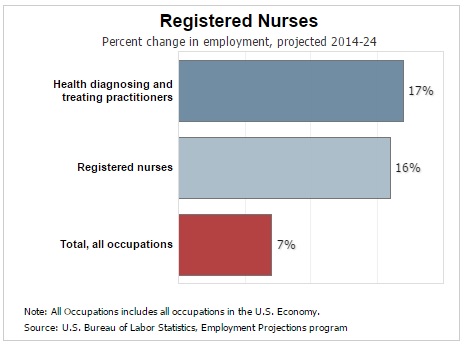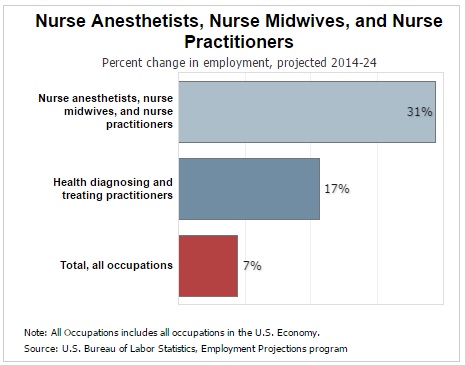A nursing career is a excellent decision: You are able to not only help people to recover from and deal with medical problems. Also, you have the opportunity to make high wages and to always be in demand in most parts of the country. More and more, nursing professionals are being relied upon to provide much of the medical care in the US today.
This is confirmed by the Bureau of Labor Statistics, which notes that job demand for registered nurses will increase by 16% by 2024. Meanwhile, demand for advanced practices nurses, such as nurse practitioners and nurse midwives, will increase by 31%.
RN Demand Feature

NP Demand Feature

Another great aspect of entering the nursing profession is that there are many educational paths you can take, depending upon your career goals.
Most Common Nursing Education Programs
Below are the most common nursing education career paths that are available. There are online and on campus degree programs available for most of these paths.
Bridge Programs
A nursing bridge program allows you to start with an RN diploma, associate’s degree or even a bachelor’s degree in nursing, and earn your next degree without having to go through the entire three or four year degree program. Bridge programs are especially suitable for current working professionals who are either RNs or have a degree in another field, but want to earn a bachelor’s degree or advanced degree in nursing. These programs are also suitable for Licensed Practical Nurses (LPNs) who want to earn a BSN or MSN degree in a shorter time period.
Nurse Practitioner
A nurse practitioner or NP is a type of advanced practice nurse that provides direct patient care with a great deal of autonomy, although most NPs work under the supervision of a doctor. NPs do physical assessments, do minor procedures and administer tests, and diagnose and treat many diseases and conditions.
To become a nurse practitioner, you need to earn a Master of Science in Nursing and complete approximately 500 hours of clinical hours. Earning an MSN degree takes at least two years full time, and you may earn this degree online, although you must complete your clinical hours locally and pass the certification exam for the state in which you will practice. Most NPs were registered nurses with a BSN before they started on their advanced degree, but other educational paths are available (see below).
MSN with No BSN (Direct Entry)
If you have a bachelor’s degree in another field and want to become a nurse or a nurse practitioner, one exciting option you have is to earn a Master of Science degree in Nursing without earning a bachelor’s degree first. This educational path is referred to as a direct entry MSN program.
The major advantage of this degree program is that you can earn an advanced nursing degree faster than you could if you had to earn a BSN first. This path also gives you access to some of the best paying nursing professions: NP, certified nurse midwife, clinical nursing specialist and more.
LPN to BSN
If you are currently a licensed practical nurse, you have an active RN license and have attended nursing school for at least one year. By earning your bachelor’s degree in nursing, you will open the door to higher paying positions with more responsibility.
With your current level of experience and education, you have the chance to earn your BSN in less than four years. Note: In TX and CA, LPNs are referred to as Licensed Vocational Nurses, or LVNs. Earning your BSN means a hike in salary of at least $20,000 or more in many cases. Your current employer also may pay for part of your education.
ADN to BSN
A popular way to enter the nursing field today is to earn a Associate’s Degree in Nursing, which is a two year program. You then may work as an RN after you pass the NCLEX-RN exam and earn a good salary of $35,000 or $40,000 or even more. See a comparison of ADN vs BSN.
Then you can earn your next degree with an ADN to BSN program, which can likely be completed in two years or less.
The American Nurses Association strongly encourages all ADN and RN diploma holders to earn their BSN within 10 years of getting their RN license.
RN to BSN
An RN to BSN bridge program is for a healthcare worker who has an RN diploma, which is usually obtained after taking a year of nursing classes. There are fewer RN diploma programs today, as many of them have been supplanted by associate’s degree programs.
But if you have an RN diploma, you can earn your bachelor of science degree in less than four years by attending this type of program.
RN to MSN
For nursing professionals who have an RN diploma or an associate’s degree in nursing and want to really improve their career prospects, the RN to MSN program could be for you. You already have one or two years of nursing education, and you can apply to an RN to MSN bridge program and earn your master’s degree without earning a bachelor’s degree separately.
This path could save you two years or more in obtaining your education, and you now have access to high-paying advanced nursing practice roles that pay $80,000 per year and more.
MSN to DNP
If you already have your MSN degree and have experience as a advanced practice nurse, you may decide you want to obtain your terminal nursing degree: the Doctor of Nursing Practice or DNP. This is usually a research or executive leadership degree that professionals earn who want to get to the top of the field.
Expect to spend four to six years to earn your DNP degree after your earn your master’s degree.
MSN vs DNP vs BSN
As this article clearly shows, there are a great many educational path options for entering the nursing profession. Which path you select simply depends upon how long you wish to be in school, how much money you want to make, and what your career interests are.
Earning a BSN will provide you with access to many exciting nursing positions in hospitals and medical facilities. The demand for floor nurses and speciality nurses will continue to increase for years.
If you want to earn a higher salary and work in the higher level, advanced practice nursing professions such as a nurse practitioner, you may want to earn your MSN.
And if you are interested in executive nursing leadership or research, earning your DNP may be your best option. Easily compare the DNP vs the MSN in this easy to read article.
Doctorate in Nursing
Earning your DNP degree is a good choice for the nursing professional who wants to lead large hospitals or medical centers, or wants to spend their career in nursing research.
Note:
If you want to become an advanced practice nurse, such as a nurse practitioner, be aware that the American Association of Colleges of Nursing recommended in 2004 that the Doctor of Nursing Practice degree must be the new standard to be a nurse practitioner. The DNP degree is not yet universally required to become an NP in all cases, but be aware that you could be required to earn your DNP degree in the near future to practice in advanced practice nursing.
BSN to DNP
If you have an active RN license and have years of experience as a nurse with a BSN, you may decide that you want to get off of the hospital floor and into nursing administration, leadership or research. There are BSN to DNP bridge programs available so that you can earn your doctoral degree slightly faster without earning an MSN first.
Dual Degrees
Lastly, for professionals who want to combine clinical nursing with another career interest, there are also dual degree programs out there, such as:
- Master of Science in Nursing/Master of Public Administration: Earn an MSN degree with a public administration master’s if you want to work in the non-profit or government sectors.
- Master of Science in Nursing/Master of Business Administration: This is an ideal dual degree program for people who desire to have clinical nursing and business administration skills so they can work in business management.
- Master of Science in Nursing/Master of Public Health: Earn an MSN degree to provide clinical care to patients, and earn an MPH to discover how to apply those skills to entire at risk populations.
These types of dual degree programs are advantageous because you can earn two advanced degrees in much less time and at less expense.
















